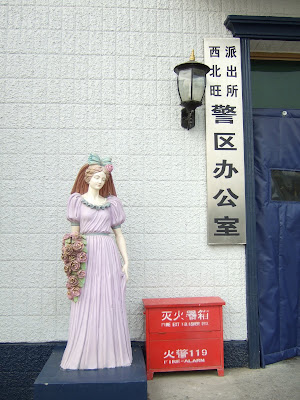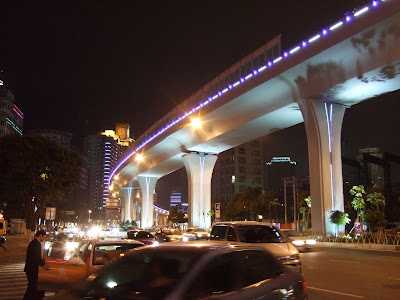This morning I had an opportunity to see US Secretary of State Hillary Clinton.
The ideal was actually scenario would be to shake her hand, pass on my condolences about Socks the cat passing and hope she had a productive Asian tour.
But this was how I spent my Sunday morning:
8:20am Meet my colleagues in the office. Two of them aren't here yet! One doesn't answer my call...
8:40am We head over to two company cars waiting for us, black Audis. The driver of the car I'm in starts moving the car before we've closed the back right door and there's a horrible crunch sound. Part of the siding is ripped out. Brilliant.
8:55am We arrive at the south gate of the US Embassy. We've been told to arrive by 9am, but again my missing colleagues still aren't there! Oh wait... we see them coming out of the car now.
9:20am It's cold standing outside the US Embassy. Another coworker points out to me the US Embassy emblem that features the eagle's claws, the one of the left holding an olive branch, the other a bunch of arrows. So it's either war or peace with the Americans.
9:30am We're finally allowed inside the security area where we must give up all electronic equipment that was not previously registered with the embassy. So that means no digital cameras, no cellphones, no iPods... so much for taking a picture of Clinton. The security staff hold our things like a coat check area and we must wear a red badge that indicates we're visitors and must be escorted at all times.
9:42am A Chinese staff member leads us to a holding room and tells us to wait for an American to take us further in. Really extreme security. Meanwhile my other colleagues are fussing over how to present Clinton some gifts we've prepared for her, including a framed blown-up picture of her, Bill and Chelsea during their 1995 trip to Xian where they visited the Terracotta Warriors up close in the pits.
10:09am We're now led into another area where Clinton will engage with 20 female leaders in China invited to have a discussion with her about women's issues. It's a room that has broadcasting equipment good for press conferences and translation. In the front cream-coloured sofas have been set up, with a lacquered wooden screen as a background. The Chinese carpet on the floor is a nice touch.
10:40am I'm dying for the loo and find it around the corner with no lock on the door! How strange is that.
10:46am As we're not part of the women's forum, we're ushered out into the public affairs offices and literally sit around and shoot the breeze with our US embassy contact. I ask him if the US ambassador to China has been named yet and contrary to speculation in the Chinese media, no one has been chosen yet. There was talk Clinton would make the announcement on her trip here, but she explained to the media that they have yet to decide who will take this important post.
Our contact has already planned out what President Barack Obama would do if he were to visit Beijing. He says he'd arrange for Obama to play basketball with the Chinese team and then to have a webchat with young people, answering any questions they have about him, even his favourite NBA team.
He also explains he's anxious because Clinton needs to leave the embassy by 1pm for a police escort to the airport. The airport have cleared a certain time frame for her plane to take off. If she misses it, she'd have to wait until after 4pm to take off.
11:20am Some of us need to go to the washroom again and a woman staffer escorts five of us to the loo. She politely waits for us outside and only after all five of us come out -- and she even checks the women's washroom -- before taking us back to where we were.
11:32am Our contact decides to move us closer to the room where the forum is being held as we will meet Clinton there at 11:50am. Other security staff keep pushing our group around saying this space has to be clear or that space can't have people congregating... we stand around waiting and still finalizing our logistical procedure for giving Clinton our presents.
11:46am One of my colleagues complains that we should already be in the room setting up but the discussion still isn't over yet.
11:55am Our contact hears clapping, signalling the end of the forum discussion, but Clinton has yet to come out for her breather before meeting us. My coworkers are getting antsy because they worry we will have less time with the Secretary of State.
12:07pm Clinton is finished and we are finally allowed into the room, escorted of course. My other colleagues are already busy moving furniture and getting lights and cameras ready. Clinton's handlers are giving explicit instructions that photographers can only take pictures for the first minute, but then after that no photographs allowed. They demand to know why there are three video cameras when they had been told there would only be two. One is quickly wisked away before more complaints arise.
12:12pm Wires are running all over the floor and there's concern someone may trip. Tape is brought out and two coworkers are taping down wires until the last minute. The rest of the wires are shoved under the carpet... which isn't really a good idea.
12:18pm Where's the microphone for Clinton? One of her handlers says Clinton wants to put it on before walking in. Makes sense. Then in the back we can hear her voice as the mic broadcasts it into the room.
12:20pm We're asked if we're ready because Clinton is coming. There's a hush in the room as she emerges, smiling in a dark navy suit and turquoise top underneath. She sits down and puts on her own microphone, the old pro that she is. She's only 10 feet away from me...
12:21pm A Tsinghua University professor chats with her about climate change, asking her what she, Bill and Chelsea do about protecting the environment. She answers that they use compact light bulbs, recycle and insulate their house.
She regurgitates a lot of what she said the day before, about how she is hoping China will not repeat the same mistakes as the US in its wasting of natural resources. She stresses it's not about per capita emissions -- something China constantly prides itself on -- but on absolute emissions. Clinton says China and the US are the two top emitters of greenhouse gases so the two countries must work together, raising the profile of climate change to a higher level in their dialogue so that things can get better.
There are no specifics, but she praises the good start the two countries have in their relationship and hopes to build on that to include climate change. She also hopes something constructive will come out before December when the countries will meet to discuss the next step after the Kyoto Protocol.
12:37pm The chat ends and we quickly gather, hoping for an opportunity for a group photo with Clinton. However her two handlers, two young women are tough gatekeepers and try to stop photographers from taking more pictures and us giving her gifts. However, when one of my colleagues shows her the large framed photo she exclaims with excitement and thanks us for it.
We also wanted to ask her to write a congratulatory note to our company, but one of her handlers was physically pushing the paper away. Clinton sees this and says, "Jessica, I'll sign it."
Definitely a star diplomat.
12:47pm Clinton is already out the door, wearing an overcoat and flanked by her entourage and the Washington press corps following her.
12:52pm I and a few others leave but we have to be escorted by a staff member all the way to the security area and out the door. We get our stuff back and then exit the embassy.
One of the world's most powerful women has left the building.



























